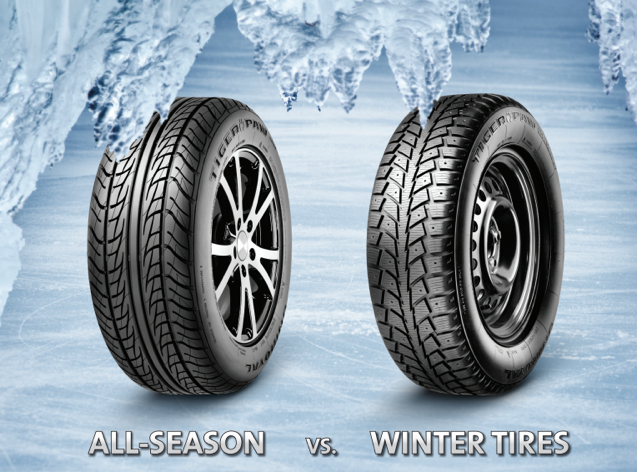Winter Tires
Everything You Need To Know About Winter Tires
Living in Alberta we know all too well how the winter months are associated with poor driving conditions, resulting in an increased risk of collisions. It is important to change your tires before the harsh Alberta weather hits so you can continue to drive as safely as possible when going to work or school. This is why we recommend the use of winter tires. These tires are made of advanced compounds and unique tread designs to ensure high grip on icy or snowy roads, providing superior traction against the unfavorable conditions. Now is the time to start preparing for winter.

How Do Winter Tires Work?
Winter tires may look similar to summer or all-season tires, however they have an aggressive and unique tread pattern. The materials used are specifically engineered for the low temperatures and harsh conditions of winter.
Advanced Materials
Winter tires are made of a soft compound that help to keep their grip in cold temperatures. This compound also contains more rubber and silica (which acts like sand) that helps to make the tires flexible yet sticky. Some studless tires may contain crystal-like particles that act as studs for extra grip on ice.
Unique Tread Design
Another advantage of winter tires are their unique tread designs and thin cuts in the tread pattern also known as sipes. During winter conditions, sipes increase traction when the end points of those tiny cuts open a bit as the tread is pushed against the road. All those tiny open points effectively bite into the snow and grab some additional traction. The unique trade design used on winter tires is designed to maximize traction and push snow out of the way, making braking up to 50% more effective.
For the most extreme conditions, you can get metal studded winter tires that perform even better than regular winter tires on wet and rough ice.

What About All-Season Tires?
Living in a country such as Canada where winters can promise to be long and harsh, “all-season” tires aren’t really appropriate for all seasons. Although all-season tires are designed to handle both wet and dry conditions, they are made of a harder compound that loses traction at temperatures below 7°C. When it comes to the tread patterns, all-season tires are designed to enhance comfort and reduce noise in warm weather. However with heavy snow, the treads become clogged making the tires slippery and subsequently unsafe.
Frequently Asked Questions
How can I be sure I have a real winter tire?
Look for the Snowflake Mountain Symbol on your tire, see image on the right. It’s the Tire and Rubber Association of Canada’s guarantee it’s passed safety standards.
How long should I keep my winter tires on for?
It is recommended you keep winter tires on until temperatures are consistently above 7°C. For us Canadians that typically translates to taking them off some time during March or April – when we are lucky.
Can I store my all-season or summer tires at your store?
Yes, you are welcome to store your all-season or summer tires with us during the winter season for your convenience. For more info call our Parts department to arrange this, 780-410-3814 or toll free at 1-888-419-6990.
Can I just replace the two front or back tires?
You should replace all 4 tires when switching to a winter tire regardless if your vehicle is front-wheel-drive, rear-wheel-drive, or all-wheel-drive. Transport Canada notes that without changing all 4 tires, you can expect unsafe handling and dangerous stability issues.
Do I need to get a wheel alignment when changing to a winter tire?
Nope! If you require a wheel alignment in general, a winter tire swap is a great time to perform one – but you’ll never have to perform an alignment due to a tire change.
It’s supposed to be a mild winter. Will all-seasons work?
Unless it’s forecasted to stay above 7°C all winter, no. Remember, winter tires are significantly more effective even on dry clean pavement than all-season or summer tires due to the rubber compound. Winter tires are best, even though the winter is forecasted to be mild.
Get Your Winter Tires Today
Knowing the difference between winter and all-season tires is important so you know when to change your tires. Get your next set of winter tires at Toyota Northwest Edmonton today at 14240 137 Ave NW in Edmonton, AB. Our expert Parts Team will assist you in finding the perfect set of winter tires for your vehicle. If you have any questions concerning winter tires or staying safe in your car this winter, give us a call at 780-900-5897.
